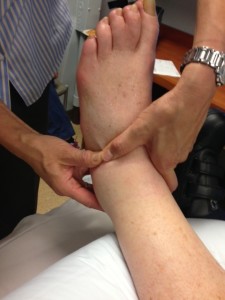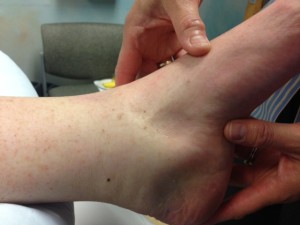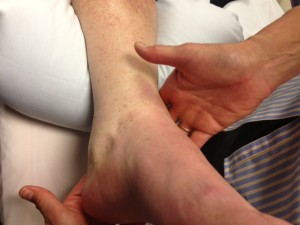By Bob Osborn, RN
One of the most common problems that affects people with motor neuron diseases is called dependent edema. This is swelling of the hands and feet which gradually extends upwards into the arms and legs. This is caused because veins depend on muscle movement to return blood and fluid to the heart. Without the muscle movement, fluid pools in the veins which become overloaded. The fluid then starts to seep out of the veins into the surrounding tissue.
Treatment
The swelling that follows cannot be reduced by diuretic medications (“water pills”). Elevating the legs or arms to a level higher than the heart is most helpful. This can be accomplished with positioning in a power wheelchair (tilt and recline and elevating leg rests), or in a bed by adjusting the leg position or placing pillows under the legs. Gentle massage with a lotion of preference can also help. Use the lotion to protect and moisturize the skin, which can be fragile if there is swelling. Massage from the toes or fingers always going upward toward the heart. This will help shift the excess fluid back into the veins and gravity will help the vein return the fluid to the heart in a more normal way. The massage motion is similar to the action of slowly working toothpaste from the bottom of the tube to the top.
Prevention
One thing that can help prevent the swelling to begin with is compression stockings. Rather than get the kind usually used in hospitals, I usually recommend that people go to a travel website (TravelSmith, Magellan, etc) and order airline socks. They work just as well, are easier to get on and off, and are about 1/3 the price.
Warning
Should the skin become reddened and warm, medical attention should be sought as this could be cellulitis. Also, should the limb become very swollen, cold and/or numb seek medical attention immediately as this could be an indication of a blood clot blocking circulation.




Massaging an area that contains a blood clot can dislodge or break up the clot and send the clot or fragments through the blood stream to the brain or lungs. Never massage an arm or leg that is more swollen than the other one, feels quite warm to the touch, is painful in a way that feels different from the discomfort of the usual swelling. If the swelling is in the leg or foot, flex the toes upward. If this causes pain in the leg it is highly indicative of a clot. Any of these signs require immediate attention even if it means a trip to the Emergency room.
“Thank you for your comment. This is very good and accurate information. My apologies for not being more clear in the original post. Bob”
I, too, thank Diane for her warning to accurately assess clot risk and recommend immediate treatment if it is suspected. When I first began working with people with ALS I assumed that pulmonary emboli (PE), due to immobility and deep vein thrombosis (DVT), would be common. I was always on the lookout for symptoms of new onset shortness of breath at rest. I have now discovered that in ALS this appears to be rare. I am not sure why. An interesting study out of the UK (presented during the poster presentations at the International MND Symposium in Orlando in 2011) showed no incidence of DVT and PE in a randomly selected group of ALS patients with dependent edema. I am interested in the experience of other patients and clinicians. Quality research on this topic is hard to find.
Henri,
A hoarse voice, like Bob Osborne, R.N. says, is most likely due to changes in the muscle tone in the vocal folds (aka: vocal chords). There are a few other possible, though less likely causes for hoarseness.
1. Acid Reflux – ALS can weaken the sphincter muscle that keeps stomach acid from coming back up. This acid can irritate the focal folds and may cause hoarseness.
2. Postnasal drip- Your dad may be having more difficulty with mucus and this can effect the voice.
3. Though unlikely, his voice changes can be related to conditions other than ALS.
I recommend your father visit a speech therapist who can not only help diagnose the reason for the voice changes but also evaluate other aspects of his speech. A speech therapist will want to get a baseline of his speech rate and may also want to talk with him about ideas like voice banking or the use of a voice amplifier.
Amy Roman, Speech Therapist
My dad has Motor neuron disease and his feet are also swollen and very cold.His voice is very hoarse at the moment. Can you please tell me why?
Henri,
The swelling and temperature change are from the dependent edema described in the blog. Elevation and massage are the best remedies for this type of swelling. For the hoarseness in the voice, this could be weakening of the vocal cords, or possibly not enough forceful air exhaling to fully operate the vocal cords.
Hope this helps, feel free to post more questions!